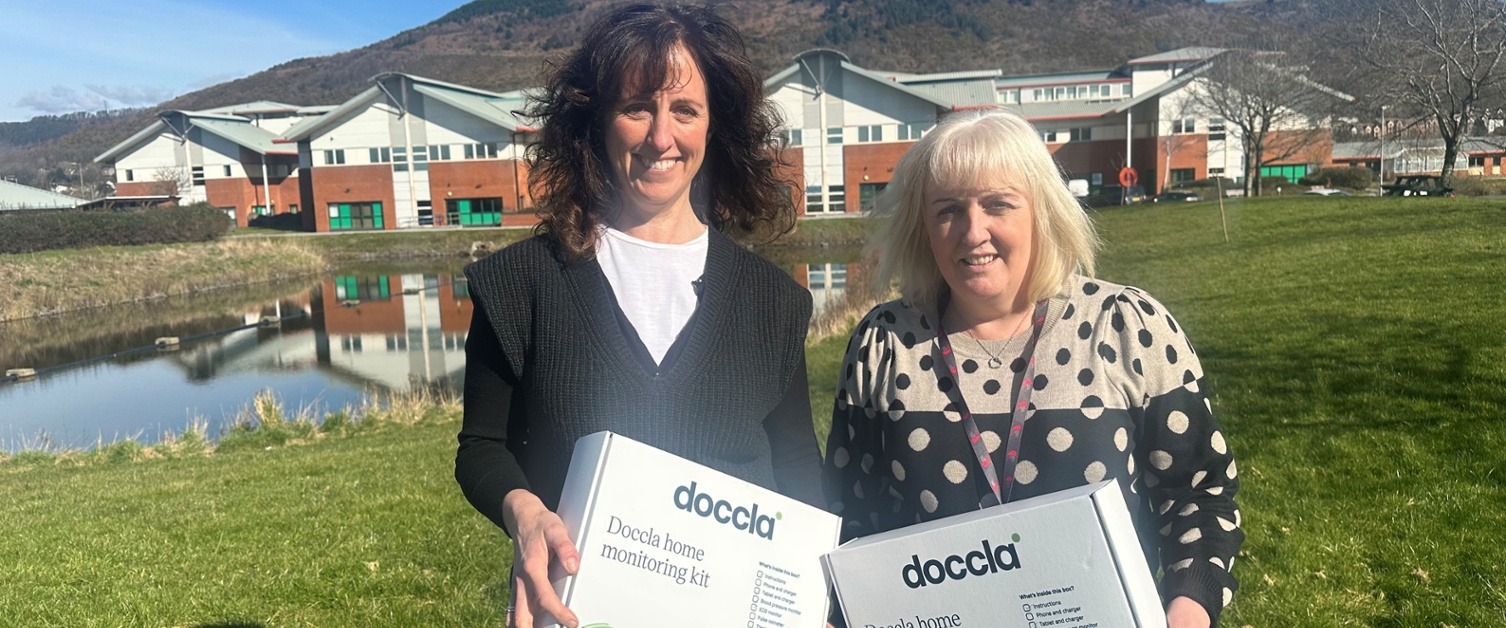People living with heart failure can stay out of hospital thanks to remote monitoring

9 July 2025
People living with heart failure in Wales are set to avoid unnecessary hospital admissions, having to turn up for routine clinics and needing to take time off work, because of technology-enabled virtual care for remote monitoring.
It’s a service offered by NHS Wales Performance and Improvement’s Value Transformation directorate.
The directorate works with health boards in Wales by bringing the monitoring technology directly into people’s homes and supporting them in making sure they have everything they need to get it up and running.
Swansea Bay University Health Board’s community heart failure service is adopting this nationally supported remote monitoring for its patients.
The heart failure service currently sees around 1000 people and wants to use the technology to improve outcomes for two distinct patient groups. Firstly, for those patients who can be rapidly optimised with their heart failure treatment. These patients are in general, more well and are in work or keen to get back to work, as an example. Secondly, those patients who have more complex needs and need regular reviews, to keep them living well within the community, receive care closer to home and to avoid possible unnecessary hospital admissions.
Hayley Taylor is the lead nurse for the community heart failure service within Swansea Bay UHB and said: “Our patients live with a long-term progressive illness, and we’re committed to supporting them in achieving their best possible quality of life.
“We want to reduce avoidable hospital admissions. We want to reduce unnecessary clinic visits. This technology means we can support patients, when suitable, in managing their condition effectively at home.”
“It’s a different way of working.
“Our patients can contact us directly through the digital messaging, whereas before they didn’t have access to us like that, other than coming to see us in person.”
“Just as important, we have immediate access to their results, which means we can make quicker and more informed care decisions.”
That is how the technology works. Eligible patients are given a touch screen device, installed with an intuitive app tailored to their condition and care needs. The app seamlessly connects to monitoring devices again tailored to their condition. In this case for people living with heart failure it would be an ECG device, weighing scales and a blood pressure monitor.
They use the technology in the comfort of their own home, which sends their data securely to dashboards that clinicians can access, prioritise and act on the information they are getting.
Hayley said: “Many of our patients have been with us for a while and have become confident in managing their condition.”
“But – without access to remote monitoring equipment, such as a blood pressure monitor or weighing scales, patients often rely on noticing physical symptoms before seeking help.”
“In heart failure, clinical indicators may be present much earlier, prior to patients becoming more symptomatic.”
“By providing patients with this tech, it means we can detect early changes in their data and intervene before symptom development.”
“Being proactive in this way will prevent avoidable hospital admissions. But it also empowers patients to take an active role in managing their condition.”
“It will also enhance their quality of life. They can go about their daily lives knowing their health is being monitored and supported remotely.”
Prof. Chris Brown is the National Director of NHS Wales Performance and Improvement’s Value Transformation directorate. He said: “This high tech, but personal solution, keeps people connected, engaged and in control giving both our patients and healthcare teams the choice in how care is delivered.
“Remote monitoring empowers patients.”
“It gives them the tools they need to monitor their health while knowing that NHS Wales is closely monitoring their wellbeing.
“This model of care reflects the way we live in a modern society and technology is best when it brings people together.”
Supported by Value Transformation, the remote monitoring kits and technology are being used in other services, not just heart failure. Cwm Taf Morgannwg UHBi is using the technology as part of service integration between the Same Day Emergency Care team and the Navigation Hub. Cardiff and Vale UHB is using the kit in its Safe at Home service designed to support more patients to remain at home or leave hospital as soon as possible.
To talk to NHS Wales Performance and Improvement’s Value Transformation team about remote patient monitoring contact them at NHSPI.ValueTransformation@wales.nhs.uk